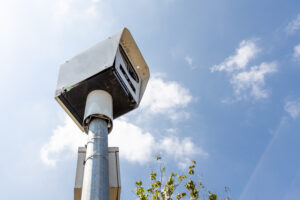House passes bill adding regulations, limits on traffic cameras

Close-up of speed trap surveillance camera along highway to control speeding to reduce speeding-related accidents.
by Robin Opsahl, Iowa Capital Dispatch
April 9, 2024
The Iowa House approved a bill Tuesday to regulate traffic cameras, despite criticisms from some lawmakers who said the bill unfairly limits local control, and others who said the automated traffic enforcement systems should be entirely banned.
Iowa lawmakers passed House File 2681 on a 85-12 vote after approving an amendment brought forward by Rep. Phil Thompson, R-Boone. The amendment added some restrictions included in a similar Senate bill, including a prohibition on small communities’ use of cameras and requirements for use of revenues from fines.
Thompson said he would like to see more restrictions on traffic cameras, but the legislation is needed now to control traffic camera use in Iowa.
“While I certainly would prefer to ban these outright, the longer we sit around and do nothing on this, the more we’re seeing these systems being abused across our state,” Thompson said.
The legislation would require local governments to receive permits from the Iowa Department of Transportation before they are able to implement automatic traffic enforcement (ATE) systems. It also sets standards for fines collected on speeding violations recorded by traffic cameras — the maximum set at $500 for drivers reaching more than 30 miles per hour above the speed limit.
To get a traffic camera permit from the DOT, Iowa cities and counties would have to provide the department with an explanation for why the cameras are needed at the location, including records on the number and severity of accidents, speed of drivers, and related safety concerns at the spot. The bill also would not allow tickets to be issued for speeding violations under 10 miles per hour above the speed limit. Warning signs would have to be placed between 500 and 1,000 feet before any cameras.
Local governments with populations at or below 20,000 would not be allowed to use mobile traffic camera technologies to issue tickets, but could still use them to issue warnings. Cities and counties would also be required to use the funds collected from cameras for transportation infrastructure improvement, or for operational costs for local police and fire departments.
Some lawmakers hoped the legislation would go further. An amendment was introduced by Rep. John Wills, R-Spirit Lake, to entirely ban traffic cameras in the state. Wills said traffic cameras are unconstitutional because they do not provide due process or give person ticketed the right to be confronted by their accuser.
“These cameras are not fair,” Wills said. “They’re not something that we should be doling out justice in a way that is not fair to all of our citizens in this state.”
Democratic Rep. Sami Scheetz was among those who said traffic cameras play an important role in making Iowa roads safer. In his own community of Cedar Rapids, he said, traffic cameras have resulted in a decrease in accidents, and give law enforcement an avenue to address speeding in areas where traffic stops may be dangerous.
“I understand the concerns by many about the traffic camera systems,” Scheetz said. “Many cities are unfortunately abusing ATE systems to supplement their budgets. … However, it is important to note that the evidence clearly supports the continued use of ATE as part of our commitment to safe roads.”
Wills’ amendment failed in a 47-50 vote.
During subcommittee meetings on the bill, representatives of local law enforcement departments praised the bill for adding regulatory oversight to traffic camera usage in the state. But some lawmakers said on the floor that certain provisions, such as preventing smaller communities from using mobile traffic enforcement systems, could negatively impact rural police departments’ ability to enforce traffic laws.
The bill moves to the Senate and was referred to the Senate Ways and Means Committee for further consideration.
The Senate considered another bill, Senate File 2337, earlier this session that would have combined restrictions on traffic cameras with “hands-free” driving legislation. The bill was put on the “unfinished business” calendars in both chambers, but no action has been taken by lawmakers since February.
Iowa Capital Dispatch is part of States Newsroom, a nonprofit news network supported by grants and a coalition of donors as a 501c(3) public charity. Iowa Capital Dispatch maintains editorial independence. Contact Editor Kathie Obradovich for questions: info@iowacapitaldispatch.com. Follow Iowa Capital Dispatch on Facebook and Twitter.











